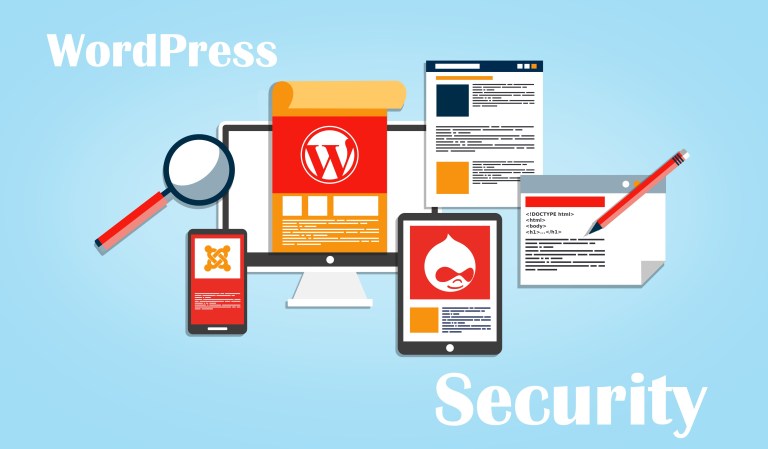Simple Tricks to Secure Your WordPress Website
- Category : Website Security
- Posted on : Oct 26, 2017
- Views : 1,973
- By : Yakov R.

WordPress is undoubtedly a renowned and favorite CMS or content management system all over the world. After buying the Domain you can build your own blog or business website in WordPress. The number of sites under WordPress is increasing day-by-day. The security issues are also rising at the same time. Each week, Google is blacklisting around 20,000 sites of malware and more than 40,000 for phishing. Looks like the situation is very acute and flaccid, isn’t it? So, how will you secure your WordPress website?
Securing your website is the first thing you should always keep in your mind. You know that the online security is improving and the hackers are also advancing their cyber attack techniques. So, do you think you have no risk? I am sorry to say it my friend, but the risk factors are increasing day-by-day. So, what should you do? You should always keep your mind awake and follow the security measurements.
Here you’ll see how to deal with the WordPress security. You’ll get some valuable tips and tricks regarding WordPress security. So, let’s get started,

6 Tricks to Secure Your WordPress Website
SET UP SITE LOCK DOWN AND BAN USER
The website lock down feature works like a magic as usual. Continuous login attempt will lock the site down. So, the good news is, there’s no room for hackers. No brute force attempts, no chances of being hacked. When someone tries to get into your database by providing repetitive and continuous wrong passwords, the site gets automatically locked and you’ll be instantly notified. You can use the Login Lock down plugin for better security. This plugin can also track the hackers IP. So, you can also ban the intruder.
2-FACTOR AUTHENTICATION
2FA is comparatively the best security measure to secure your WordPress website. So, how it works? In this case, a user has to provide login details in two different components. Only the website owner will be able to decide what those two components will be. It can be a secret character, secret question or secret code along with the login details. But 2-factor authentication really works.
CHANGE YOUR PASSWORDS REGULARLY
Do not stick to the old password. You better play around with your passwords and should change them regularly. You can improve your password strength by adding variations. Always try to put an alphanumeric password. You can also add upper and lowercase letters, special characters along with the numbers.
WP-ADMIN DIRECTORY PROTECTION
Protecting WP-Admin directory is imperative. The admin directory is the heart of your WordPress website. This’s the place to control the entire site. So, make sure that your admin directory always stays secure. So, you can password-protect your admin directory. How? You can use two passwords to get into your dashboard. One is for the login page and the other one is for the admin panel. In that case, you can use AskApache Password Protect plugin for better security.
SSL TO ENCRYPT DATA
You should imply an SSL or secure socket layer to your admin panel. It ensures a very secure data transfer between the server and the user browser. SSL certificate makes the way difficult for a hacker to breach the connection and steal the info. SSL certificate has another positive stand for your site! Google usually ranks sites with SSL certificates higher than the sites without SSL certification.
KEEP YOUR BACK UP
Keeping off-site back up is mandatory. It really doesn’t matter how strong your security is, always be prepared for the drawbacks. Keeping back up will help you from losing tons of precious data from your database. At least you can restore most of the lost data. You can use some plugins to keep your back up. Blog Vault, Backup Buddy, Vault Press are the plugins for better back up security.
Final Verdict
So, this is how you can secure your WordPress website. These are some basic understandable things you must take into your account. There are so many protective measures. However, these steps will assure the higher security to your website. As an owner, you should love your website and take real care of it. Because, at the end of the day, your website is the medium by which now you can preach your words and promote your business worldwide.
Categories
Subscribe Now
10,000 successful online businessmen like to have our content directly delivered to their inbox. Subscribe to our newsletter!Archive Calendar
| Sat | Sun | Mon | Tue | Wed | Thu | Fri |
|---|---|---|---|---|---|---|
| 1 | 2 | 3 | 4 | 5 | 6 | |
| 7 | 8 | 9 | 10 | 11 | 12 | 13 |
| 14 | 15 | 16 | 17 | 18 | 19 | 20 |
| 21 | 22 | 23 | 24 | 25 | 26 | 27 |
| 28 | ||||||
Recent Articles
-

Posted on : Jul 25
-

Posted on : Jul 07
-

Posted on : Apr 07
-

Posted on : Mar 19
Optimized my.cnf configuration for MySQL 8 (on cPanel/WHM servers)
Tags
- layer 7
- tweak
- kill
- process
- sql
- Knowledge
- vpn
- seo vpn
- wireguard
- webmail
- ddos mitigation
- attack
- ddos
- DMARC
- server load
- Development
- nginx
- php-fpm
- cheap vpn
- Hosting Security
- xampp
- Plesk
- cpulimit
- VPS Hosting
- smtp
- smtp relay
- exim
- Comparison
- cpu
- WHM
- mariadb
- encryption
- sysstat
- optimize
- Link Building
- apache
- centos
- Small Business
- VPS
- Error
- SSD Hosting
- Networking
- optimization
- DNS
- mysql
- ubuntu
- Linux













